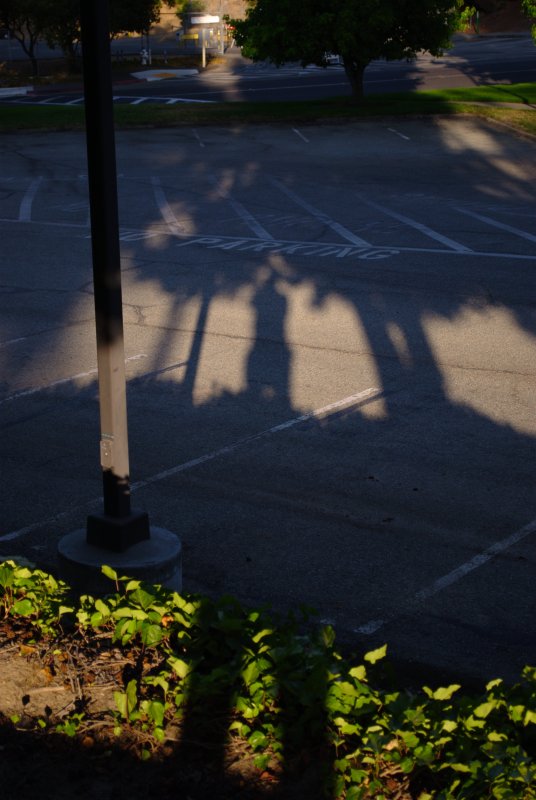SF Bay Area, July 2008.
Land of ideas
When I was looking for places to live out here, I wasn’t having a lot of luck. I’d go and meet the property owners, and I’d come close to begging them, and still they’d never call me back. This was before the “economic slowdown” really started, though, and Web 2.0 staffing was still in full swing. For a moment, I was convinced I’d been transported to New York City, except there were no cabs, decent delis, or Korean corner groceries to be found.
After I gave up on the individuals posting properties on Craigslist, I was looking at the larger commercial complexes. Some of the places were downright dingy, and I was afraid I was going to end up someplace sketchy. I started plugging apartment complex names and addresses into search engines. The review sites didn’t have a whole lot of data, and almost all of the postings were bad. I’d always wondered if love or hate was a more powerful motivator, and on the rental front, it looked as if negativity had won out.
The other thing I’d find was patent applications. On a half dozen addresses I checked out, I would get hits back from patent filings. People that invented things lived in places where I might live. While none of the applications really stand out as something world-changing and you can patent pretty much any damn thing nowadays, I still thought that was really cool. I wasn’t getting hits from the police blotter, or listings for yard sales; I was finding proof of the tradition of invention that made the greater Bay Area famous.
While the 90 miles between San Francisco and the end of Silicon Valley aren’t paved with gold, they are littered with crazy ideas and the crazier people that came up with them. Very few other places can compete with that.
In a minute
Would anything happen without deadlines? This must be another one of those two kinds of people things: those that self-motivate and those that need a deadline in order to accomplish anything. I will self-impose a deadline if someone else doesn’t. That’s why this whole blog challenge has been successful: I have to get something written by midnight.
Pressure does help me; I am one of those “good in a pinch” people. I am also good at determining something is not urgent and pushing it aside, even if it is important. The biggest thing that falls into that category for me personally is exercise. I have benefited in the past from taking organized classes because I have to stick to a schedule that way.
I don’t know where my ability to procrastinate comes from. Is it one of those “I still have my whole life ahead of me” sorts of things? Is it a visceral, hedonistic desire: why should I do something productive that will pay off eventually when I could do something that’s instantly gratifying like look at random crap on the web? I heard a radio program on procrastination one day, but I knew I could always get the podcast of it later, so I didn’t pay much attention to it.
That’s one of the dirty secrets of the future: time shifting creates a sort of debt. People have backlogs of email, unread RSS feeds, TiVo’d shows, and unheeded podcasts waiting for time that will never make itself available. Now we have email bankruptcy and the like. Since I’m always looking for short-term distractions, I’ve never had to just purge my inbox and start over, and I don’t really use feed readers because I’ll just feel dirty and shameful for never reading all the stuff that I feel I should read but manage to get along without.
Is procrastination getting worse? I’m not sure. Let me check with a few experts and get back to you on that.
The hip bone’s connected to the internet
So the future. In the future we’re all connected, all the time of course. I’ve carried a Blackberry for a few years now. I disdain those Crackberry addict people, but I probably one of the worst. I’m very fidgety, and I have an interactive distraction right at my fingertips. Since I don’t wear a watch, I check the damn thing constantly, and usually twice in rapid succession because I never remember what time it was on the first check. When herself and I are apart at non-work times, I text her regularly, like a teenager would with his first crush. I need help.
The principal drawback to having that level of connection is that work is always there, seemingly waiting for someone to do it. At my old job it was horrible because every single problem that came across, I could probably fix. Since I’m fidgety, I had to work really hard to ignore the little messages about things being slow or down, and I usually failed. The new job involves the occasional interaction with someone from across the world, so email requests at 2 am aren’t from an insomniac, but from someone really just starting his/her day. It would only be considerate to respond in a timely manner, right?
The person I feel the most bad for, though? My physician. She gets no rest from the tedious. I have the cholesterol levels of a 45-year-old Beef Council member. I went and blood drawn on Thursday afternoon, and since this is the future, just like everyone else, she can work from anywhere. She reviewed my counts and posted an admonishment this afternoon. She probably wanted to get into medicine to help people, not to have to tut-tut me about a health problem I (and rest of the country) should be able to manage without her direct intervention.
Ubiquitous connectivity: making sure people can’t get a break from life’s little annoyances.
The power of suggestion
There are two kinds of people in this world: those that get songs stuck in their heads, and those that don’t. I am most certainly in the former category. It doesn’t take much for some vintage tune to lodge itself firmly between my ears. I wish I knew what made me so susceptible to that kind of suggestion.
The songs are almost always deplorable, like “Guantanamera”, “Don’t Stop Believing”, or The Diff’rent Strokes theme. Sometimes the origin is simple: seeing John Mayer accompany Dave Chapelle on his show resurrected the sitcom theme. The Journey classic is a preferred method of torment used by herself. The old folk tune is my form of reciprocity.
I think the worst part of any of these songs is that I only know the chorus, let alone the whole melody or all of the worlds. With “Guantanamera”, I don’t even know that — I have to fake it. Thus it makes it almost impossible for me to get any kind of closure organically. I either have to be completely distracted so that part of my brain can quiesce, or I have to hear the song.
The same phenomenon happens with food, too. If someone else says, “I had a yummy doughnut for breakfast,” I’m probably going to start salivating and want a yummy doughnut, too. While getting a fried dough craving at the drop of a hat isn’t convenient, that can’t compete with when someone mentions they had some inaccessible regional delicacy that I can’t get here. I’m not sure if that’s a by-product of my suggestible nature, or if it’s a symptom of my rarely in remission wanderlust, though.
The other kind of grand slam
Somewhere in my adolescence, my mom decided to drop out of the corporate world and go back to working in restaurants. At the time I couldn’t understand why — she always came home tired and smelling of a mix between the daily special and dish sanitizer. We also ended up in a different tax bracket. While I could tell she was generally happier, it wasn’t until many, many years later when I had to deal with corporate politics of my own that I could understand what drove her away.
On the weekend nights when she’d have to close, I would try to stay up and wait for her. The consequences of this were two-fold: I was pushed further down the dark path into becoming a night person, and I learned to love the questionable cuisine of all-night diners.
After spending all day around barbecue or pasta or beer, the last thing she wanted was to eat what was on offer at work, and even worse, cook. Our options were limited, so we became regulars at Denny’s, Village Inn, and the independent place that had good onion rings. This was our bonding time, the time that kept us from growing apart in those troubled teenage years. The foodie in me regrets those patty melts and home-fry and egg skillets, but the dime store psychologist in me knows that if every mother and child could share just a few of those meals, fewer very special episodes and interventions would be shared as well.
I really couldn’t tell you what we talked about now. Sometimes it was important, but most of the time it was old fashioned kibitzing. One thing I do remember though: the Asian Amway meetings. I think they were just after midnight, going from Saturday into Sunday. We would go to the restaurant down off the highway, and our food would have just arrived when a big table — 8- or 10-top — would get sat in the middle of the restaurant. All Asian, all in business attire; ties for the men and skirts/dresses for the women. We usually sat pretty near them, and I don’t think we ever paid attention to what they said — we just decided it was the post-Amway meeting pancakes and pie. They were there as often as we were. I wonder if that group noticed us and made up stories to explain why we were eating the same thing and re-hashing the same questions.




